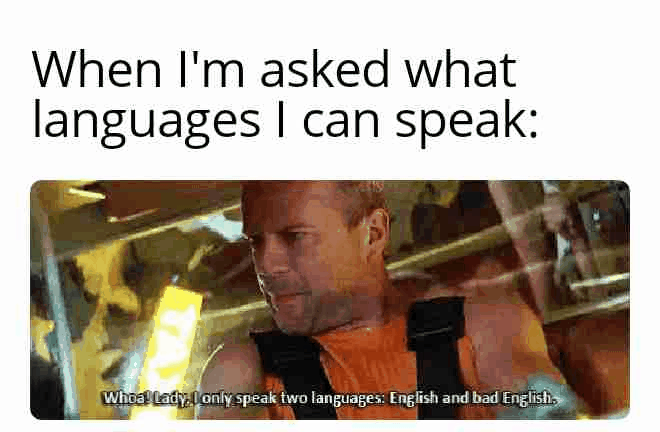Alternatively, in the languages I speak:
Welche Sprachen sprechen Sie? (Deutsch/German)
¿Qué idiomas habla usted? (Español/Spanish)
Quelle langue parlez-vous? (Français/French)
EDIT: These sentences are now up to date.
!esp@lemm.ee for Spanish speakers
thanks, this is going to help with my exposure.
straylian, and that’s about it
Native English, conversational japanese, survival German (I was conversational at one point, but it’s mostly gone), a tiny bit of french (same as German), very basic Spanish, and a tiny bit of Hebrew (I wanted to learn something in the semitic family and it seemed less intimidating than Arabic to start with)
Only truly fluent in English.
Tetapi aku bisa bicara bahasa Indonesia. Ada komunitas bahasa indonesia dalam lemmy? Aku tidak bisa cari apa-apa.
J’ai etudié francais a l’université, mais maintenant j’ai oublié beaucoup.
I speak a little Chinese, but am fully illiterate in it.
انا بتهكي عربي شواي
Estonian, English and a couple of the simplest words in Russian.
English and Scots Gaelic.
A bheil gàidhlid agad?
Very cool!
(Spanish):
Mi lengua materna es el español.(English):
I speak English as my second language.(French):
Je parle rançais aussi, me pas aussi bien que l’anglais. (Ouais je sais, ce n’était pas un accident)(Japanese):
日本語も できるよ。2年ぐらい 勉強している。実際、去年 日本語能力試験を受けて、N4が できた。言語は 勉強の頑張れば、頑張るほど、よくできるよ。(Russian?):
When I was in highschool I started learning russian, but since then I’ve forgotten most of it, I can only say hi, good (morning/afternoon/evening) and other easy things. I don’t have a russian keyboard but it’s ‘Privyet’, ‘Dobraye utra’, ‘Dobrij bchyer’, ‘Spakoinai nochi’, ‘Spasiba’, ‘Izvinitye, ya nye ponimayu, ya nye goborit po-russkij’, ‘ya nichyevo nye snayu’.(German?):
Ich lerne Deutch im Moment mit meine Freundin. Aber ich bin nicht gut.Si quieres algunas observaciones… “¿Qué idiomas hablan ustedes?” Sería lo correcto (de acuerdo a la RAE). Creo que utilizaste la conjugación de la segunda persona singular del verbo hablar “tú hablas”, en vez del plural “ustedes hablan”. Et en français, je ne sais pas pourquoi, mais mon cerveau me dit que “¿Quelles langues parlez vous?” Va mieux. Und auf Deutch, ich denke dass “Welche Sprachen sprechen sie?” richtiger ist.
How do you learn kanji?
I lived for some time in Japan so I learned to talk and to read the kanji useful in the everyday life (like in the restaurant or the bus). But I feel like reading the news is still too hard and I do not even know where to start.
The best way to do it is to try reading an article and stop at every kanji you don’t know to look it up. It’s a slow process but the struggle’s what makes it easier to remember. Maybe try it with manga first as the panels help give context to what’s being said and the shounen stuff has hiragana above the kanji to help look it up.
I have a dictionary app called ‘akebi’ that shows me the words, the kanjis and the stroke order; and I also use google keyboard with the onscreen-drawing pad for japanese, so every kanji and kana I wrote on my previous comment was hand drawn by me. It takes a bit of time to get used to, but it really helps.
Also, learning about the origins of kanji, it’s radicals and history helps a lot, you’ll start creating connections in your head about pronunciation and meaning. You’ll associate meaning and sound to kanjis a lot faster that way. I’ve come to the point of hearing a word, learning it’s meaning and then I come up with the possible kanjis that make it up, and surprisingly I’m right 60 to 80% of the time!
Try calligraphy too. I learned all the kanjis that originated hiragana, and sometimes I see them in the wild and immediately know their pronunciation (60% of the time)
I’ts a matter of patience, and motivation, A LOT of motivation.
Thanks for the tips! It is motivating me actually :)
fluent in Maltese (native) and English. Conversational in Italian. I was one of the last generations to grow up without the internet, so we had to watch TV. And we’re in close proximty to italy so we could get their channels. It is much less common nowadays for kids to also know Italian here. But people my age have no idea what Dragon Ball Z sounds like in english. We all watched it in Italian.
Ustedes should be hablan
Pas parle Americano
Dutch, German, French, English and what starts to become passable Slovak.
Welche Sprache sprechen Sie*
Welche SpracheN with n
Fair point.
Was für eine Sprache du sprichst.
Keine Verständliche
- I have spoken English since birth.
- Je parle français depuis l’âge de 7 ans, parce que je l’apprenais à l’école.
- Estudiaba el español en la escuela secundaria.
- Jag lär mig svenska i fler än tio år.
- Ich kann etwas Deutsch lesen und verstehen.
And thanks to my Swedish, I can read a surprising amount of Danish and Norwegian.
I would call myself proficient in French, passable in Spanish, barely functional in Swedish, and I can get by in German in a very banal emergency. 😉
Jag lär mig svenska i fler är 10 år
That sentence, while clear on what you want to communicate, is quite clearly not written by a native Swede.
I am a native Swede and this is how I would reformat it:
“Jag har studerat Svenska i mer än 10 år.”
If I wanted to be less formal I’d use the slang “pluggat” instead of “studerat”
“Jag har pluggat Svenska i mer än 10 år.”
Unsurprising. I’m still well in the stage where I’m formulating thoughts in English, then translating into Swedish. Very occasionally something pops out spontaneously, fully-formed, and in Swedish.
I’m mostly thrilled to have got “i” right there, because I haven’t quite memorized i/på with time expressions. It will come.
How well does your formulation convey the nuance that I’ve been learning (off and on, often passively), but often not actively studying? The verbs “att studera”/“att plugga” feel more to me like actively working, but of course, my feelings in this regard are more about English “study” than those Swedish words.
The suggestion I made tells others that you have actively studied the subject.
If you want to say that you have studied actively, but sporadically, you would say something like:
“Jag har väl studerat Svenska lite till och från under typ 10 år nu”
That is a causal way of saying it.
If you have only passively learned the subject, I would phrase it like this:
“De senaste 10 åren har jag hört och läst mycket Svenska, och har då lärt mig en del.”
This puts focus on how you were exposed to a subject and what you learned from it
“till och från” is a new one for me, so thank you. I would have used “här och där”.
The last formulation makes perfect sense to me. I like to think I could even have written it.
Tusentack för att du tog tid för att förklara lite.
“à l’école”, but otherwise flawless. You don’t see complex sentences with properly conjugated verbs from a lot of second language speakers, so I have a feeling your French is indeed pretty good.
No notes on your German. It sounds more formal than when I’d tell a friend but it def sounds right to me.
Thank you. What little I can speak or write is very firmly 1980s textbook German.
Huh…where’d you learn Swedish?
Mostly self study from a variety of sources. I lived part time in Stockholm for four years, but it was far easier than I’d expected to speak only English, so although my reading and writing improved, my speaking and listening didn’t. Every time I tried, they switched to English on me. I don’t blame them.
Now I’m a bit stuck: I can’t find much to listen to that’s at my level. I’m past the beginner stuff but can’t keep up with Swedish spoken at full speed.
Just go for volume. Listen to a lot of stuff at full speed and eventually it will start making sense.
I know enough Spanish to embarrass myself. I know enough of Nahuatl to understand some glyphs. I speak English at an American level, which is greasy.
Samples from the four I know:
My name is Leni.
Nimi mi li Leni.
Hake anni Leni.
– -.-- / -. .- – . / … … / .-… . -. … .-.-.-
Samples from ones I know selectively:
O Leni to’u i’oa.
Ko Leni toku ingoa.
Meu nome é Leni.
Je m’appelle Léni.
I only speak two languages: English and bad English.
straylian, and that’s about it.

Aw, I was gonna make that joke










